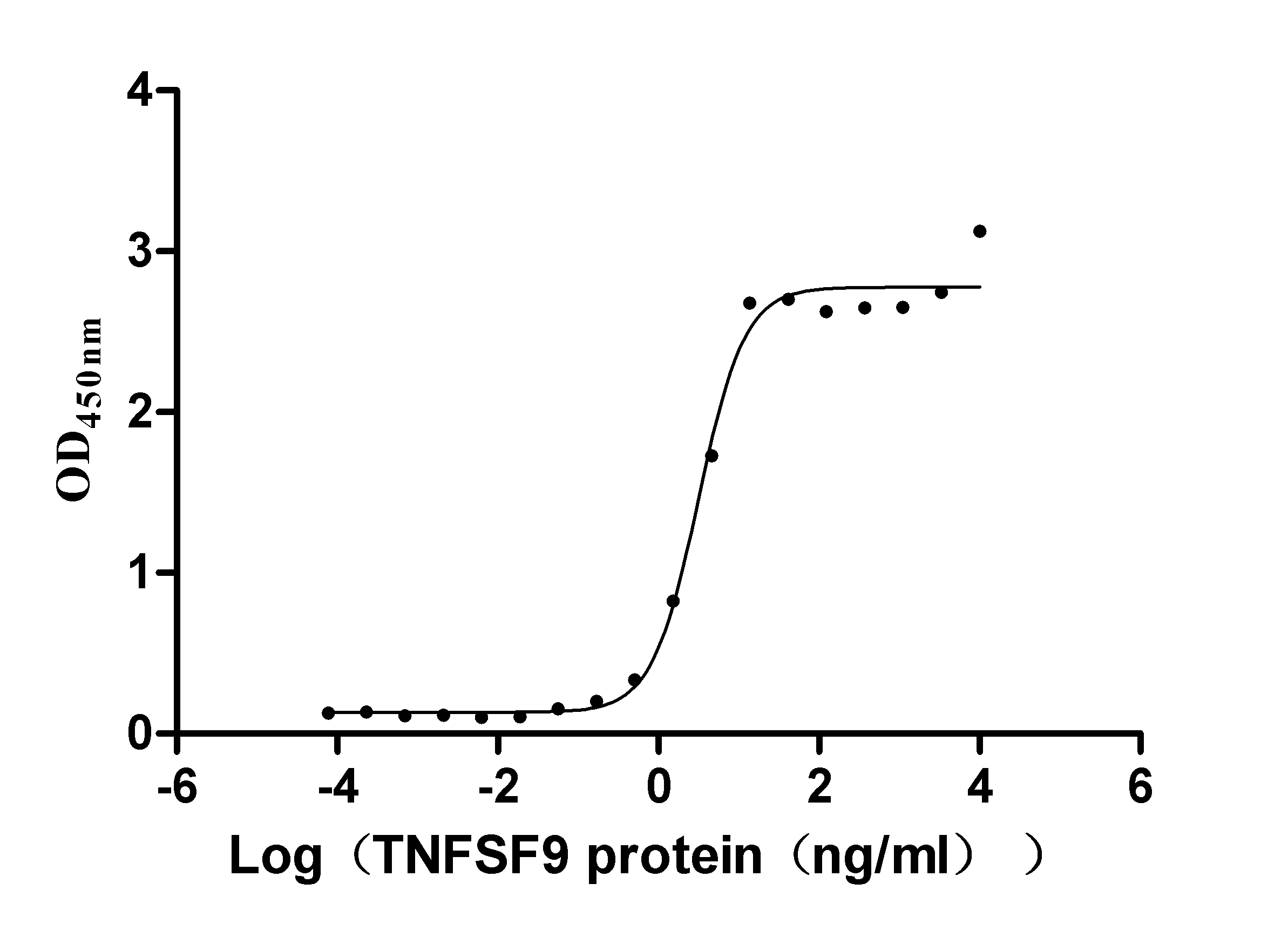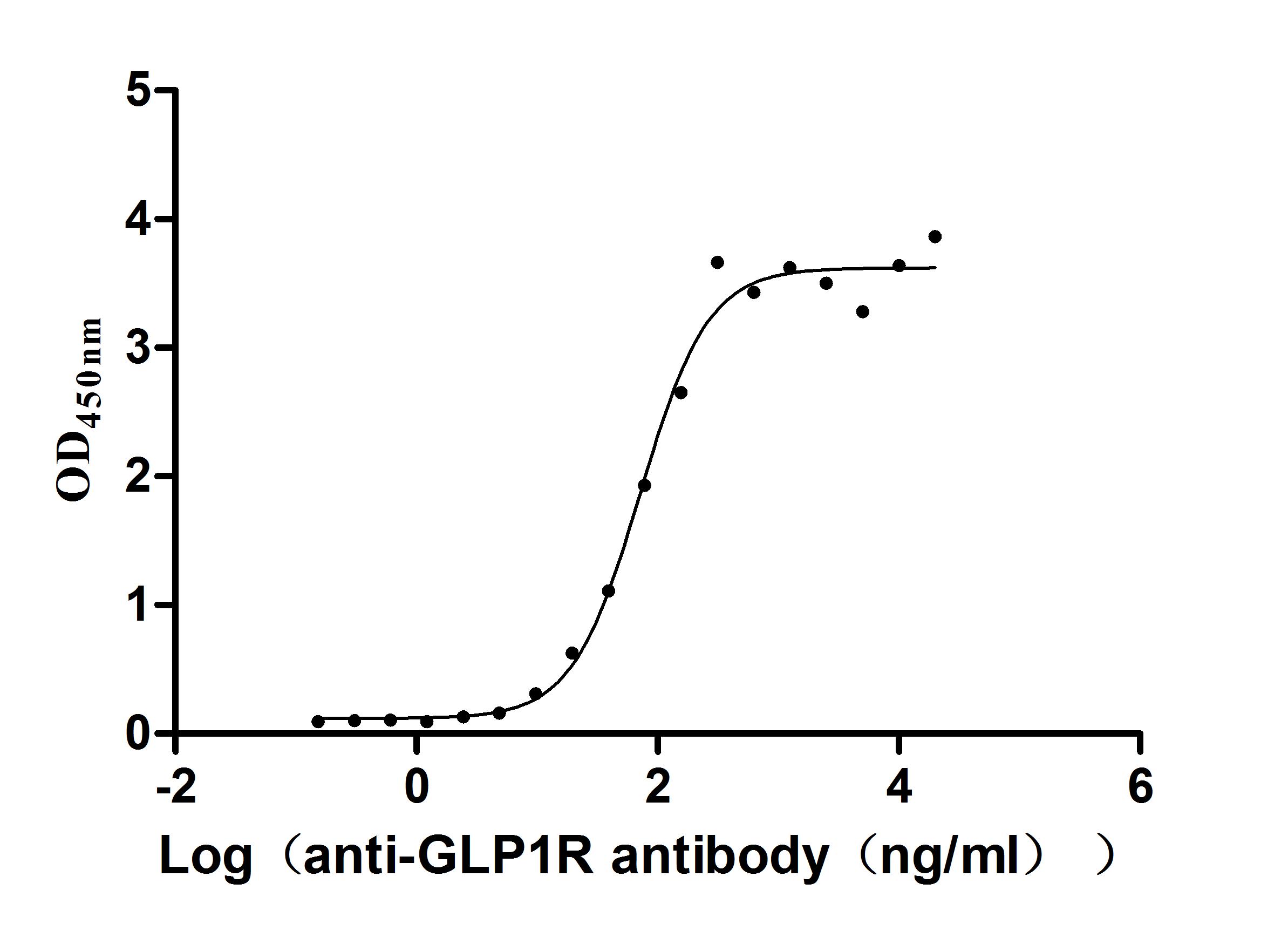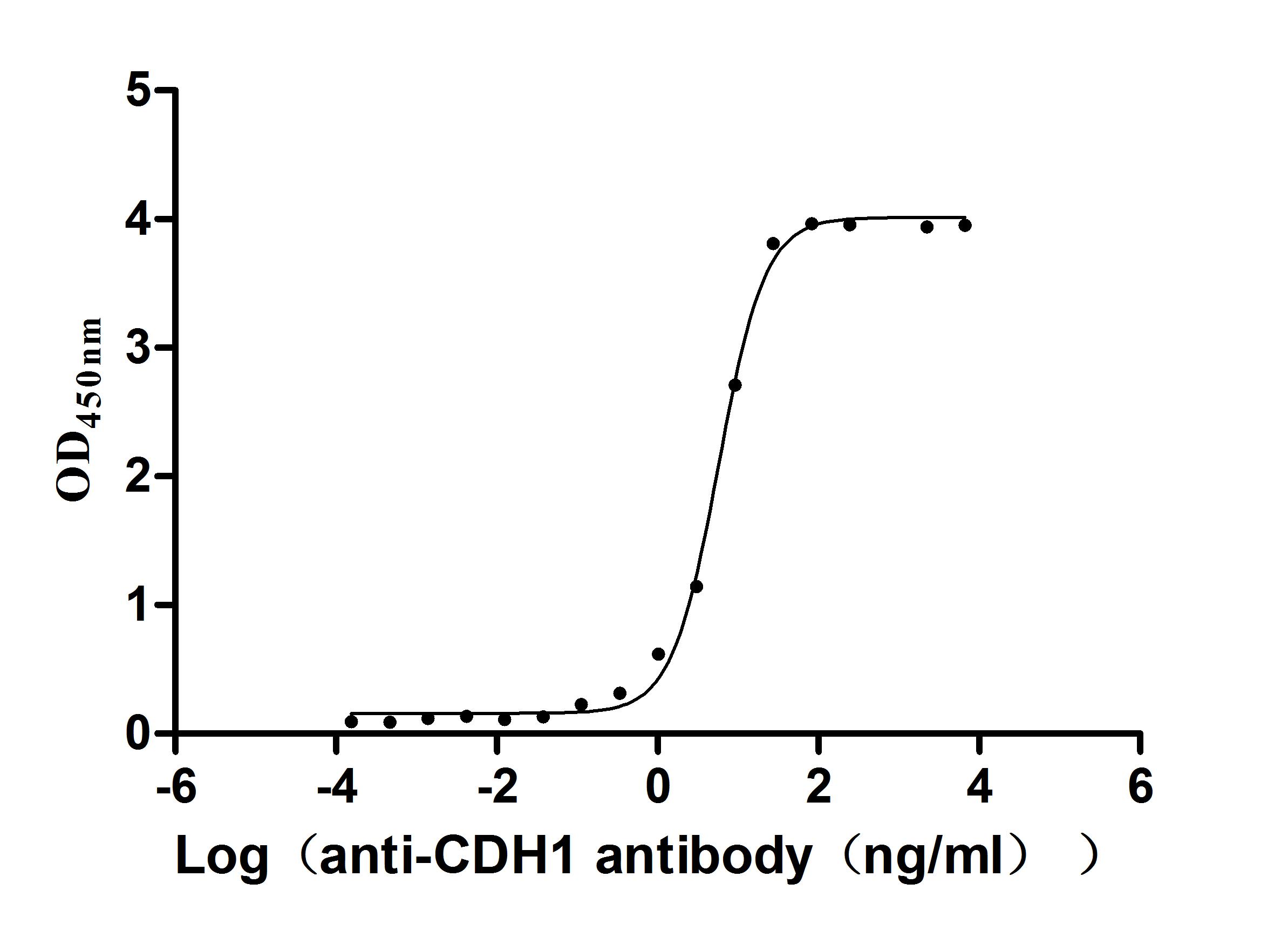Recombinant Human Coagulation factor VII (F7), partial
-
货号:CSB-BP007930HU
-
规格:
-
来源:Baculovirus
-
其他:
-
货号:CSB-EP007930HU-B
-
规格:
-
来源:E.coli
-
共轭:Avi-tag Biotinylated
E. coli biotin ligase (BirA) is highly specific in covalently attaching biotin to the 15 amino acid AviTag peptide. This recombinant protein was biotinylated in vivo by AviTag-BirA technology, which method is BriA catalyzes amide linkage between the biotin and the specific lysine of the AviTag.
-
其他:
-
货号:CSB-MP007930HU
-
规格:
-
来源:Mammalian cell
-
其他:
产品详情
-
纯度:>85% (SDS-PAGE)
-
基因名:Name:F7
-
Uniprot No.:
-
别名:coagulation factor VII (serum prothrombin conversion accelerator); Coagulation factor VII; Eptacog alfa ; F7; FA7_HUMAN; Factor VII ; Factor VII heavy chain; Factor VII light chain; FVII coagulation protein ; OTTHUMP00000018733; OTTHUMP00000018734; Proconvertin; Serum prothrombin conversion accelerator; SPCA
-
种属:Homo sapiens (Human)
-
蛋白长度:Partial
-
表达区域:61-212
-
氨基酸序列ANAFLEELRP GSLERECKEE QCSFEEAREI FKDAERTKLF WISYSDGDQC ASSPCQNGGS CKDQLQSYIC FCLPAFEGRN CETHKDDQLI CVNENGGCEQ YCSDHTGTKR SCRCHEGYSL LADGVSCTPT VEYPCGKIPI LEKRNASKPQ GR
-
蛋白标签:Tag type will be determined during the manufacturing process.
The tag type will be determined during production process. If you have specified tag type, please tell us and we will develop the specified tag preferentially. -
产品提供形式:Lyophilized powder
Note: We will preferentially ship the format that we have in stock, however, if you have any special requirement for the format, please remark your requirement when placing the order, we will prepare according to your demand. -
复溶:We recommend that this vial be briefly centrifuged prior to opening to bring the contents to the bottom. Please reconstitute protein in deionized sterile water to a concentration of 0.1-1.0 mg/mL.We recommend to add 5-50% of glycerol (final concentration) and aliquot for long-term storage at -20℃/-80℃. Our default final concentration of glycerol is 50%. Customers could use it as reference.
-
储存条件:Store at -20°C/-80°C upon receipt, aliquoting is necessary for mutiple use. Avoid repeated freeze-thaw cycles.
-
保质期:The shelf life is related to many factors, storage state, buffer ingredients, storage temperature and the stability of the protein itself.
Generally, the shelf life of liquid form is 6 months at -20°C/-80°C. The shelf life of lyophilized form is 12 months at -20°C/-80°C. -
货期:Delivery time may differ from different purchasing way or location, please kindly consult your local distributors for specific delivery time.Note: All of our proteins are default shipped with normal blue ice packs, if you request to ship with dry ice, please communicate with us in advance and extra fees will be charged.
-
注意事项:Repeated freezing and thawing is not recommended. Store working aliquots at 4°C for up to one week.
-
Datasheet :Please contact us to get it.
相关产品
靶点详情
-
功能:Initiates the extrinsic pathway of blood coagulation. Serine protease that circulates in the blood in a zymogen form. Factor VII is converted to factor VIIa by factor Xa, factor XIIa, factor IXa, or thrombin by minor proteolysis. In the presence of tissue factor and calcium ions, factor VIIa then converts factor X to factor Xa by limited proteolysis. Factor VIIa will also convert factor IX to factor IXa in the presence of tissue factor and calcium.
-
基因功能参考文献:
- TF-FVIIa/trypsin-mediated PAR2 activation leads to enhanced MMP-2 expression in human breast cancer cells contributing to tumor progression. PMID: 29870887
- The current meta-analysis suggested that polymorphism of R353Q in factor VII was not associated with the MI risk. PMID: 30278561
- The obtained results suggest a possible protective role of Gln353 and -122C alleles in Recurrent Miscarriage. PMID: 27504943
- FVIIa-antithrombin levels in early and late preeclampsia PMID: 28887028
- model predicts that small vesicles promote activation of FX by the extrinsic tenase (VIIa/TF) significantly better than large vesicles PMID: 28935233
- Low levels of FVII:C and FVIIa reflected the degree of consumption of the coagulation factor among paediatric sepsis patients with disseminated intravascular coagulation. PMID: 28492702
- Report a good correlation between the type of F7 mutation and/or polymorphisms and FVII:C levels, without a direct link between FVII:C and bleeding tendency in factor VII deficiencies. PMID: 28447100
- Polymorphism rs6046 of the FVII gene is associated with the development of fetal growth retardation in Central Russia. PMID: 28544373
- A common pathogenic mechanism, possibly a defective folding of the mutant proteins, was triggered by the FVII mutations. The misfolded state led to impaired trafficking of these proteins causing Endoplasmic reticulum retention, which would explain the low to very low FVII plasma levels observed in patients carrying these mutations. PMID: 29246447
- FVIIa-antithrombin but not FVIIa is a ligand for LRP1, and LRP1 contributes to the clearance of FVIIa-antithrombin in vivo PMID: 27614059
- heterozygotes for FVII deficiency show rare bleeding manifestations which are also present in the unaffected family members with normal FVII levels. This indicates that Factor VII activity levels played no role in the occurrence of the bleeding symptoms. Furthermore, FVII levels of around 0.40 IU/dl are capable of assuring a normal hemostasis. PMID: 28176610
- plasma FVIIa-AT has a thrombophilic role in total and cardiovascular mortality risk in patients with clinically stable stable coronary artery PMID: 27061056
- Family-based association study revealed that the G allele of Protein Z rs2273971, and haplotypes GA, CG, and CGA of Protein Z and factor VII had a significant effect on cerebral hemorrhage susceptibility. PMID: 27350683
- Our study findings suggest a link between FVII and AR in prostate cancer pathogenesis. PMID: 27434295
- Suggest that the hemostatic effect of pharmacological doses of rFVIIa in antibody-induced hemophilia mice stems from a TF-independent mechanism PMID: 26727350
- Large deletions play a minor but essential role in the mutational spectrum of the F7 and F10 genes. Copy number analyses (e. g. MLPA) should be considered if sequencing cannot clarify the underlying reason of an observed coagulopathy. Of note, in cases of combined FVII/FX deficiency, a deletion of the two contiguous genes might be part of a larger chromosomal rearrangement. PMID: 26540129
- Holders of the R allele had significantly higher activity of coagulation factor F7 (97.66 +/- 15.48 against 83.37 +/- 15.16, p = 0.002) and factor F2 (107.45 +/- 6.03 against 103.75 +/- 6.81, p = 0.023) than holders of the Q allele PMID: 27215039
- The aim of the study was to evaluate the molecular basis behind low levels of FVII activity (FVII:C) levels in a cohort of Brazilian patients. PMID: 25828579
- Decreased plasma levels of FVIIa in patients with deep vein thrombosis may indicate ongoing consumption of FVIIa and suggest a contributory role for TF in venous thrombus formation. PMID: 25891834
- The story of FVII well summarizes the efforts of both theoretical and clinical approaches in the characterization of a coagulation disorder, that is, among the rare bleeding conditions, most frequently encountered in clinical practice. PMID: 25973586
- Identified are the FVII gene mutations in the Chinese Han population of four unrelated FVII-deficient patients, and the effect of these mutations on the function of FVII molecule level has also been elucidated. PMID: 25767893
- Letter: large volume of distribution of rFVIIa explains the persistence of some clotting potential when FVII:C is no longer detectable in plasma of patients with inherited FVII deficiency. PMID: 24763923
- Structural differences in the carboxyl-terminus between the inherited FVII and the therapeutic molecules contributed to the immune response. A naturally-occurring, poorly secreted and 5-residue truncated FVII (FVII-462X) escaped inhibition. PMID: 25104096
- Polymorphism R353Q (coagulation factor VII) does not represent a protective or risk factor for acute myocardial infarction in young Mexican individuals PMID: 25393858
- Two heterozygous mutations of F7, g.11349G>A and g.11482T>G, is associated with hereditary coagulation factor deficiency. PMID: 25863091
- factor VIIa improved heat intolerance by attenuating hypothalamic neuronal apoptosis and damage. PMID: 25033928
- Results show that the conformational allosteric activation signal extends to the EGF1 domain in the light chain of factor VIIa (FVIIa). PMID: 25344622
- F7-323Ins10 was associated with lower factor VII levels, but not with individual intraventricular hemorrhage risk in preterm infants. PMID: 25179312
- Decanucleotide insertion polymorphism of factor VII significantly influences the risk of thrombosis in patients with essential thrombocythemia. PMID: 24617727
- High Coagulation factor VII expression is associated with breast cancer. PMID: 25447311
- Persistently high levels of factor VII is associated with insulin resisitance. PMID: 24344794
- The variability in Factor VII throughout the menstrual cycle in premenopausal women is no greater than for postmenopausal women or men. PMID: 24382103
- The obtained results suggest a probable protective role of -323P10 allele against the risk of miscarriage in women with > or = 3 recurrent pregnancy losses. PMID: 25219139
- plasma level is associated with ischemic stroke subtypes PMID: 24048512
- Results suggest no association between R353Q polymorphism for factor VII and the presence or progression of coronary artery disease in the Iranian population. PMID: 24469878
- Identification of a homozygous mutation in exon 8 of coagulation FVII that is responsible for factor VII deficiency in a Chinese pedigree. PMID: 23672839
- Eight missense mutations were identified on the Factor 7 gene (p.Cys82Tyr, p.Cys322Ser, p.Leu357Phe, p.Thr410Ala, c-57C>T) PMID: 23731332
- Data indicate that nanobilayers containing phosphatidic acid (PA) bound substantially more of two proteins, factor VIIa and activated protein C, than did equivalent bilayers containing phosphatidylserine (PS). PMID: 23879866
- Data indicate that the interlaboratory precision was better for normal specimens than for factor VII (FVII) <20 U/dL with a mean coefficient of variation (CV) of 17.2% per specimen. PMID: 23590660
- Polymorphisms in the coagulation factor VII gene modulate the susceptibility to coronary artery disease in Tunisian Arabs. PMID: 22932775
- Rab GTPases regulate endothelial cell protein C receptor-mediated endocytosis and trafficking of factor VIIa. PMID: 23555015
- elevated FVII levels, and the -323P0/10 but not R353Q polymorphism, constitute risk factors for ACS. PMID: 23275237
- Data indicate that hfVII-LC and hIgG1-Fc can effectively inhibit tumor growth and metastases in SCID mice with tissue factor (TF) over-expressing colon cancer. PMID: 23494077
- Data suggest that plasma FVIIa-AT complex (coagulation factor VII-antithrombin III) is higher in portal vein thrombosis (PVT; without cirrhosis) than in healthy subjects; no difference in FVIIa-AT complex is observed in cirrhosis with/without PVT. PMID: 22958499
- Report comprehensive molecular analysis of FVII deficiency affected patients in North Tunisia. PMID: 22873696
- Prothromin genetic mutatation is one of the risk factor in the development of venous thromboembolism and myocardial infarction. PMID: 23382263
- glucose deprivation enhanced F7 expression in a mechanism reliant on prior ATF4 upregulation primarily due to increased transcription from the ATF4 gene. PMID: 22848420
- rs6046A allele in F7 associated with decreased blood pressure levels (P
- Intracellular depletion of GTP results in upregulation of coagulation factor VII. PMID: 23050902
- functional analysis of lethal factor VII deficiency due to novel mutations in the F7 promoter reveals disruption of HNF4 binding site PMID: 22628013
显示更多
收起更多
-
相关疾病:Factor VII deficiency (FA7D)
-
亚细胞定位:Secreted.
-
蛋白家族:Peptidase S1 family
-
组织特异性:Plasma.
-
数据库链接:
HGNC: 3544
OMIM: 227500
KEGG: hsa:2155
STRING: 9606.ENSP00000364731
UniGene: Hs.36989
Most popular with customers
-
Recombinant Human Tumor necrosis factor ligand superfamily member 9 (TNFSF9), partial (Active)
Express system: Mammalian cell
Species: Homo sapiens (Human)
-
Recombinant Human Claudin-6 (CLDN6)-VLPs (Active)
Express system: Mammalian cell
Species: Homo sapiens (Human)
-
Recombinant Human Glucagon-like peptide 1 receptor (GLP1R), partial (Active)
Express system: Mammalian cell
Species: Homo sapiens (Human)
-
Recombinant Human Cadherin-1(CDH1),partial (Active)
Express system: Mammalian cell
Species: Homo sapiens (Human)



-AC1.jpg)












